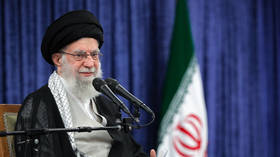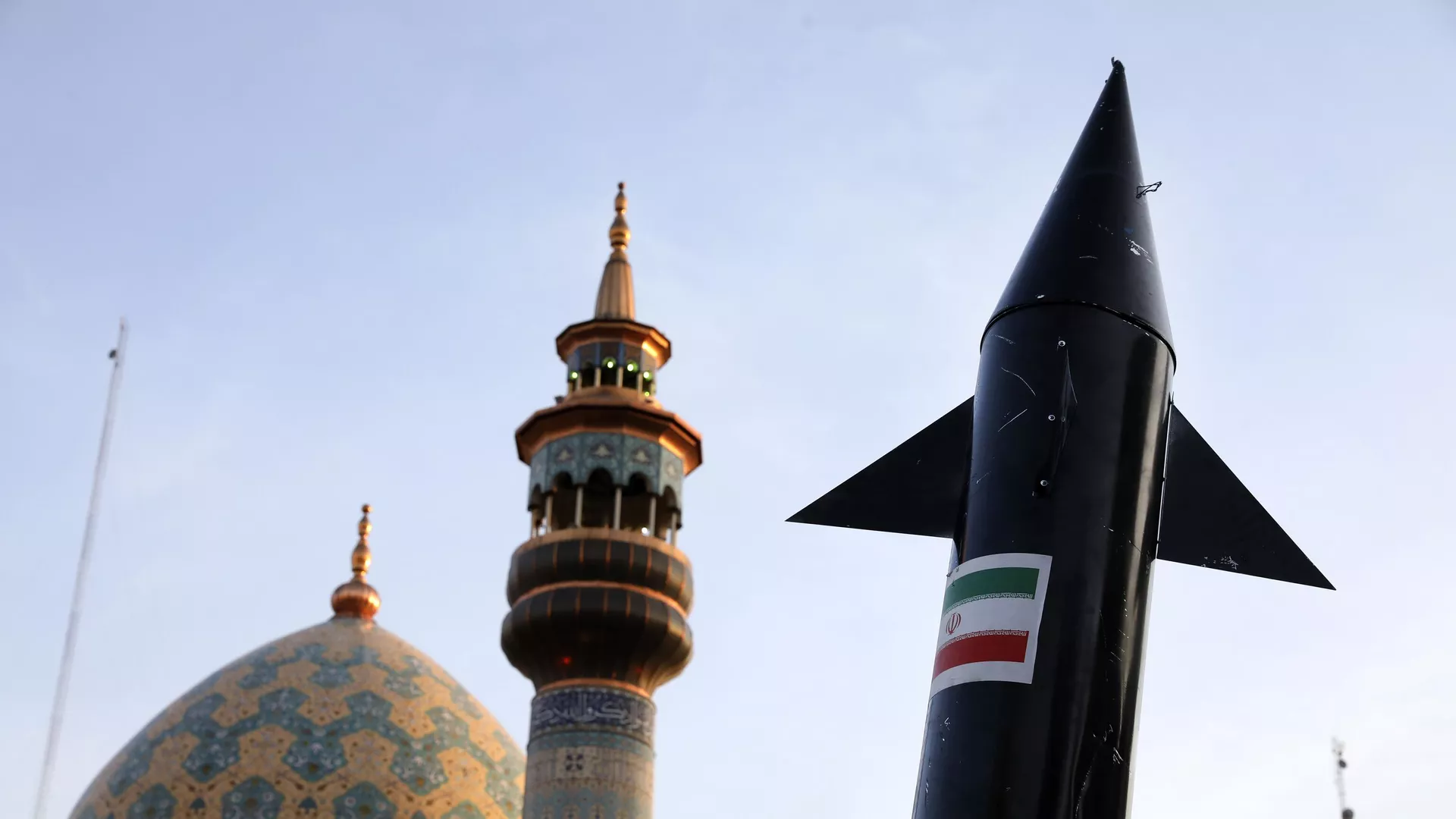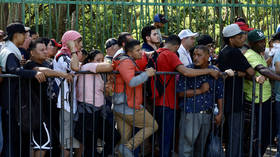By Alireza Akbari
On May 27 – the 599th day of the Israeli genocidal war on Gaza – former Israeli Prime Minister Ehud Olmert slammed the Benjamin Netanyahu-led regime’s “war without purpose” against Palestinians in the besieged Palestinian territory that has claimed over 54,000 lives so far.
He said the war waged by the Israeli regime is “without goals or clear planning and with no chances of success,” in which “thousands of innocent Palestinians are being killed, as well as many Israeli soldiers.”
“Recent operations in Gaza have nothing to do with legitimate war goals. This is now a private political war. Its immediate result is the transformation of Gaza into a humanitarian disaster area,” the former Israeli premier and Netanyahu’s political rival wrote in an article published in Haaretz.
“What we are doing in Gaza now is a war of devastation: indiscriminate, limitless, cruel, and criminal killing of civilians. It’s the result of government policy – knowingly, evilly, maliciously, irresponsibly dictated.”
Three days later, on May 30, Israeli lawmaker Ofer Cassif blamed Netanyahu’s regime for perpetuating “genocide” in Gaza under the guise of pressuring Hamas into negotiations.
In an interview with Sky News aired on May 30, Cassif condemned Israel’s genocidal campaign, which was launched in October 2023 following the historic Operation Al-Aqsa Flood.
He voiced support for any initiative that could bring an end to the Israeli regime’s “atrocities and genocide in Gaza” and ensure the release of Israeli captives.
But Cassif sharply criticized the Netanyahu regime for sabotaging efforts toward peace in the besieged coastal Palestinian territory. He specifically cited March 18 as the moment the Israeli regime broke the ceasefire with Hamas, a Gaza-based resistance movement.
When asked about Israel’s stated goal of using “military pressure” to compel Hamas to negotiate, Cassif rejected the claim outright and said, “This is a sheer lie.”
He added that the party that violated and broke any kind of agreement or possibility to get an agreement to stop the carnage in Gaza and release the captives was the Israeli regime in general and Netanyahu in particular.
It was on October 28, 2023, that Netanyahu, in a televised address, publicly declared Israel’s military objectives: to “destroy Hamas’s military and governing capabilities” and to “bring the hostages home.”
Yet, 19 months into the genocidal campaign in the besieged Palestinian territory, those goals remain unachieved – and, according to both Western and Israeli military analysts, unachievable without a permanent ceasefire and genuine commitment to its terms.

In the words of Knesset member Cassif, it was Netanyahu’s cabinet that made the decision to violate the ceasefire, offering “different fake excuses” to justify renewed attacks.
So the "blame should be put entirely" on the Israeli regime, he noted.
Nearly a week before his televised remarks on Sky News, Cassif joined hundreds of demonstrators at an anti-war rally in Tel Aviv, where he denounced the genocidal campaign in Gaza in strong terms.
“We are here today to demonstrate against ongoing genocide in Gaza,” Cassif told the crowd. “There is no war in Gaza. There is a genocide in Gaza — atrocities, war crimes, crimes against humanity.”
Protesters around him held placards reading “Stop the horrors in Gaza” and “Human beings are not collateral damage,” while others carried photographs of Palestinian children killed in Israeli airstrikes.
One day after Cassif’s appearance on Sky News, more criticism came from Assaf Meydani, an Israeli political scientist and legal scholar. Meydani pointed to “Netanyahu’s political survival” as the regime’s core motive, warning that the regime was now trapped in a dangerous deadlock.
Meydani described the situation as one of prolonged paralysis. “Israel can no longer endure months of stagnation,” he was quoted as saying.
“The problem is that Israel can no longer endure more months of stagnation — not in the war, not in rebuilding the south and the north, not in confronting the political front, and not in dealing with the West — all for the sake of Netanyahu’s political survival,” said Meydani, as quoted in local media.
That same week, the Israeli daily Yedioth Ahronoth examined Hamas’s formal response to a proposal by US special envoy for West Asia and chief negotiator, Steve Witkoff, issued in late May.
The proposal called for a permanent ceasefire, a full Israeli withdrawal from the Gaza Strip, and guarantees for uninterrupted humanitarian aid to reach the Palestinian people in the Gaza Strip.
In the analysis, Israeli journalist Avi Issacharoff said Hamas's response to the Witkoff proposal once again made it clear that, despite voices claiming that Hamas is under great pressure and on the verge of collapse, the reality on the ground is strikingly different.
"Hamas shows no signs of intending to surrender or hand over its weapons,” he wrote.

The resilience of Hamas, despite nearly 19 months of relentless bombardment of Gaza by Israeli occupation forces, became a dominant theme in late May across Israeli media.
A wave of criticism emerged against the Netanyahu cabinet, criticising it for dragging on the futile war, not for military goals but for his own political preservation.
According to assessments cited by Israeli military officials, Hamas’s "real strength lies in its connection to the population and in instilling a deeply rooted ideology.”
The Walla news site, reporting in late May, quoted military correspondent Amir Bohbot, who revealed that Israel’s original war plan envisioned a campaign lasting only a few months, but now the situation has become “complicated and unresolved.”
“Hamas remains committed to its path and is even intensifying its efforts to restore its military capabilities and maintain control over Gaza,” wrote Bohbot, as quoted by Walla.
His assessment was echoed by journalist Elisha Ben Kimon, who, in a column for Yedioth Ahronoth, detailed the continued resilience of Hamas despite prolonged Israeli genocidal offensives.
“Despite the massive military effort by the Israeli army, the organization [Hamas] is still alive, breathing, and active. Small cells continue to resist, and in the northern part of the Strip, the [Israeli] army is forced to return repeatedly to the same areas,” Ben Kimon noted.
He also offered criticism of Netanyahu’s cabinet and the strategic drift characterizing the war on Gaza.
“Six hundred days have passed since the war in Gaza began, and Benjamin Netanyahu, the Prime Minister of Israel, remains at a crossroads — hesitant and unable to make a decision,” Ben Kimon wrote, describing a political environment where factions — “from Trump and Witkoff in the West to Smotrich and Ben Gvir in the East” — each attempt to steer Netanyahu toward diverging outcomes.
Earlier, on May 26, Israeli media reported mounting strains on the military, including signs of exhaustion and psychological distress. According to reports, nearly 1 in 8 reservists have been deemed mentally unfit for combat, many suffering from post-traumatic stress disorder (PTSD).
At the same time, the Israeli military disclosed a significant expansion in troop numbers through forced conscription, raising the number of mobilized soldiers to an estimated 450,000 — the highest in Israeli military history.
The futility of the genocidal campaign was also underscored days earlier by war correspondent Ron Ben Yishai, who wrote in Yedioth Ahronoth on May 22: “Military pressure currently exerted by the Israeli army in the Strip has also lost much of its effectiveness.”
Israeli analyst Avi Issacharoff described the renewed Israeli offensives — dubbed “Operation Gideon’s Chariots” — as a likely disappointment for those hoping for a turning point in the war on Gaza.
“For those expecting Operation Gideon’s Chariots to lead to a different outcome than what has been achieved over the past year and seven months since the war broke out, they are likely to be disappointed,” Issacharoff wrote in Yedioth Ahronoth.
“The truth must be told, no matter how difficult: the Israeli measures taken during the year and seven months since the outbreak of the war in Gaza have indeed changed the picture in the Gaza Strip — but not in a way that changes the equation. Hamas is still standing.”
Meanwhile, analysts say the regional fallout from the Gaza genocide has only grown, with retaliatory attacks from Yemen in solidarity with Gaza — many of them targeting the strategic Ben Gurion Airport — marking a new phase of alarm and vulnerability for the Israeli regime.
In early May 2025, the Hebrew financial outlet Globes reported that Dublin-based budget airline Ryanair was considering rerouting flights away from Israeli airspace due to growing security concerns. The airline reportedly showed signs of being “fed up with the situation” in the occupied territories.
At the same time, the Lufthansa Group announced extended flight suspensions, raising fears among industry observers that more carriers may follow, potentially driving up ticket prices over the summer and holiday seasons.
By mid-May, further criticism surfaced in the pages of Yedioth Ahronoth, where veteran journalist Ronen Bergman wrote about growing disillusionment among settlers, soldiers, and families of captives.
“Even the army itself is struggling to grasp what it is doing and where this path is leading. On the other hand, there are the families of the captives, who see this operation as a major risk with no real hope,” Bergman said.
“The Israeli army is engaged in a campaign that it knows cannot achieve one of its primary objectives — freeing the captives,” he added, warning that the Israeli offensives are bound to fail.
Meanwhile, several reports in Israeli media pointed to the resumption of Israel’s offensive in Gaza on March 18, an escalation that coincided with retaliatory attacks from Yemen.
On May 18, The Times of Israel reported that since the March offensive resumed, Yemen’s Ansarallah movement had launched “35 ballistic missiles and at least 10 drones toward Israel.”
By mid-May, reports began surfacing about a growing rift between Washington and Tel Aviv, particularly over the US decision to negotiate independently with Yemen and engage Hamas — efforts that led to the release of Israeli-American captive Idan Alexander.
On May 16, Israel Hayom quoted war commentator Yoav Limor, who pointed to the strategic rupture: “The Israeli-American partnership was set aside this week. It wasn’t canceled entirely, but Washington made clear it is moving forward with its own interests.”
“This was evident in every matter and every arena: in the agreement with the Houthis, in which Israel had no involvement; in the agreement with Hamas that led to the release of Idan Alexander, which Israel only learned about through intelligence,” Limor said.
The political disconnect was also noted by Israeli journalist Avi Issacharoff on May 13, who described it as “a clear indication of an extraordinary failure by the political leadership in Israel.”
That same day, Maariv quoted researcher Avi Ashkenazi, who referred to Netanyahu’s strategy as “an incomprehensible adventure.”
“Months ago, Israel should have moved toward negotiations to release all captives, determine the day after in Gaza, and end the never-ending war there,” Ashkenazi stated.

Earlier, on May 9, Israel Hayom cited Limor, who criticized the silence of senior regime officials regarding the captives still held in Gaza.
“Netanyahu and Katz remain silent because they are afraid. They fear the issue of the captives, who were left unprotected in violation of the agreement approved and signed by the Israeli government.”
Limor also dismissed the Israeli cabinet’s continued reliance on force as a path to resolving the captive crisis. “Ministers imagine a world where military pressure would force Hamas to raise the white flag and release the captives. That will not happen,” he stated.
Alongside this futile and disastrous genocidal campaign, the Israeli military has reportedly been stretched to its breaking point, according to military analysts. In early May, Maariv reported a severe manpower vacuum within the ranks of the Israeli military due to the prolonged aggression in Gaza.
“The army realizes it has crossed the red line regarding the number of soldiers in regular service. The Israeli army is suffering from a shortage of over 10,000 soldiers in regular service, including 7,000 combatants and 3,000 combat support personnel on the front lines,” the daily reported.
In addition to human resource strains, the Israeli regime has faced economic backlash in maritime trade due to continued Yemeni retaliatory operations in solidarity with Gaza.
On May 5, Maariv reported that for more than a year and a half, the Yemeni army had disrupted maritime traffic through the Bab al-Mandab Strait, effectively blocking access to the Port of Eilat. The outlet described Yemen’s operations as an “unprecedented achievement.”
“They succeeded in striking one of the symbols of Israeli sovereignty, but they also managed to accomplish the mission they set for themselves: doing everything possible to isolate Israel from the outside world — and they are succeeding at that remarkably well,” the report noted.

Journalist Nadav Eyal, writing in Yedioth Ahronoth in early May, also focused on the deteriorating conditions within the Israeli military. “There is frustration within the General Staff about the way the political echelon is pushing towards an irreversible operation in the Gaza Strip,” he reported.
Eyal also referenced a telling moment that underscored the wider economic and psychological toll of the war, saying he spoke with “two businessmen who were on their way to a professional event in Israel,” whose flight had been cancelled — an incident he said reflected the broader consequences of Yemen’s retaliation against the Israeli regime.
According to Eyal, the cumulative economic damage from the strikes is expected to have “long-term significance.”
In yet another sign of public disillusionment over the regime’s handling of Israeli captives in Gaza, Yedioth Ahronoth published the results of a public opinion poll on May 2, surveying Israeli settlers on whether they believed the regime would act to secure their release if they were ever taken captive.
Almost 60 percent responded that they do not believe the Israeli regime would make an effort, or would make only minimal efforts. Only 17 percent answered 'to a great extent', while 14 percent chose 'to a certain extent'.
The findings, in the words of analysts, underlined a growing sense of hopelessness among the Israeli settlers regarding the regime’s willingness to act on their behalf if the need arises.
Press TV’s website can also be accessed at the following alternate addresses:
https://www.presstv.ir/Detail/2025/06/08/749451/spider-web-unraveled-netanyahu-genocidal-war-gaza-rips-open-zionist-entity









































No comments:
Post a Comment